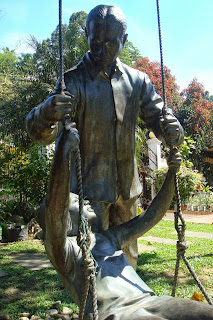the little things - 25th Sunday C 2013 benediction
“The person who is
trustworthy in very small matters is also
trustworthy in great ones; and the person who is dishonest in very small matters
is also dishonest in great ones.”
Here’s a poem by Cindy Tuttle entitled,
“It's the little things that matter,” and I think it speaks about what Jesus is
saying in the gospel today.
We prepare for crisis
by learning how to handle the small
problems
We learn to pray by noticing the little
miracles
of God's creation
We grow in faith by showing love in
little ways
We appreciate life by noticing the so
called
little things that we take for granted
Yes, it's the little things in life
that matter.
We prepare for crisis by learning how
to handle the small problems. Many of
you are given offices, positions, responsibilities. This may look small and perhaps unrelated to
the bigger things that you will be called to do in the future. What does being a housecleaning chairman got
to do with leading the parish of Molo or Lapaz?
How does being an intramural chairman help you to become a better
priest? How will dish washing help you to
become a committed husband or effective in your future ministry? It is a small thing indeed compared to what
you are called to become, but you have to understand that you learn to handle
life’s bigger problems by handling the little challenges that you meet in your
area of responsibility, you learn to handle big commitments by becoming
committed in the little things you have decided to do or are expected from you. Some of you are perhaps afraid to become
emcees for our programs and that is evident on the fact that we are becoming
more and more reliant on just one or two emcees these past few months. But remember the little things that you do
with the microphone today, the little things that you do in public is preparing
you for that day when you have to speak and captivate the crowd with the word
of God.
The poem says we learn to pray by
noticing the little miracles of God’s creation.
Do you notice the little miracles, do you pray the little miracles – the
miracle of food that appears on our table, the miracle of kindness that helps
us in our vocation, the miracle of our parents, of our teachers and the miracle
which is the presence of our formators – do you pray the little miracles. Teresa of Avila is a doctor of prayer – she
came all the way from the moat of the palace to the seventh mansion, the peak
of prayer. But she started this by
praying from the moat, to the first mansion, by praying the little miracles in
her day and in her life.
Little things matter.
And here is another point which I would
like to raise because of its affinity with our gospel today. I got it from an article in a blog by Todd
Golfard which he started by saying, how you do anything is how you do
everything. The point of this saying is
this – to develop in ourselves the awareness that
the little things we say and do, play a direct role in the bigger picture of
our existence. What you do to the small
things that happen to your life is reflected in how you do other things, and
even bigger things, in your life. Kon
nagalinapta lang ang gamit chances are indi lang kwarto ang nagalinapta, indi
lang desk ang kalat, basi pati ang paminsaron, basi pati ang kabuhi. When you are given a small task for example
how do you do it, ginapadali mo lang kag ginapahapusan or gina-utihan mo gid,
naga-focus ka gid sa imo ginabuhat. The
small stuff is a good measure as to how people put their best effort in a given
situation.
Take for example
relationships. Be aware of
parallels. May nagkadto anay nga
semianrista sa akon fourth year college. Namangkot sia, "father puede na ako
makapari." Sabat ko, "indi." "Ti," siling niya, "kon sayuron puede na ako gali
makapang-asawa?" Sabat ko, "indi." How you do anything is how you do
everything. Kon indi ka ready magpari
indi ka man na ready mang-asawa. There
are parallels.
It is necessary to be
aware, the author said of the smaller decisions and situations we make because
they tell us a lot about our habitual ways of being.

Comments